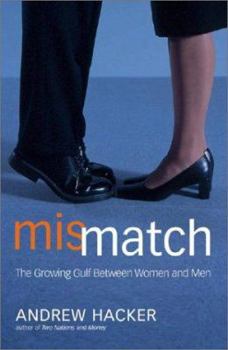Mismatch : The Growing Gulf Between Women and Men
Select Format
Select Condition 
Book Overview
After tackling the sensitive issues of race and wealth, bestselling author Andrew Hacker now turns his authoritative analysis to a topic on which almost everyone has an opinion: the relationship... This description may be from another edition of this product.
Format:Hardcover
Language:English
ISBN:0684862522
ISBN13:9780684862521
Release Date:March 2003
Publisher:Scribner
Length:228 Pages
Weight:1.00 lbs.
Dimensions:9.5" x 0.8" x 6.1"
Customer Reviews
1 rating
The changing playing field
Published by Thriftbooks.com User , 22 years ago
Sociologist Andrew Hacker examines the growing divide between men and women, specifically in the areas of marriage and family, education, career and politics. Beginning with marriage, divorce has now become so common that half of all marriages fail (Hacker's focus is the United States, to which all the data pertains, but the broader picture is similar throughout the industrialized world). People are marrying later - sometimes much later - than they used to. While the norm used to be to marry shortly after completing one's education, which itself takes longer than it used to, today's adults expect a considerable period of independence during which they invest in career or self-development. The social pressures against divorce have evaporated, as have those against having children out of wedlock. Finally, pushing the frontier of personal autonomy to a degree which earlier generations would have had difficulty imagining, more and more people are deliberately choosing to start a family as a single parent. Births out of wedlock now make up a third of all births in America, up from a twentieth in 1960. Given that unmarried couples tend to separate even faster than married couples the likelihood of their children growing up in a household with both parents are remote. The absentee parent, almost always the father, will either be off-stage from the very beginning or will appear with decreasing frequency as time goes on. By the time a child of divorce is 15 the father will be, on average, 400 miles away. Financial support is meager: the average annual payment is under $4000. Visits are infrequent; parenting responsibilities are replaced by indulgences handed out by near-strangers with pathetic sobriquets such as "Treat Dad" or "Uncle Daddy." This dereliction of their traditional duty by many, albeit not all, fathers Hacker sardonically refers to as "men's liberation." Its greatest victims are probably not the women who are left holding the bag. Most divorce proceedings are in fact initiated by women, with an even greater proportion when there are children in the household. Rather the biggest losers are the boys who grow up in low income environments and tend rapidly to escape their mothers' authority in favour of that of their peer group, which appears to be making them increasingly unsuited for the education which is now essential for social success and upward mobility. In households with incomes under $20,000 only one third of the college-bound children are male.In higher education women have overtaken men. For every 100 female recipients of bachelors degrees there are only 75 males. Progress in gaining advanced degrees is comparable; in more and more professional and academic fields women are to become the majority. Men still outnumber women in the sciences, however, and conspicuously so in the mathematical sciences. Whether this is due to nature or nurture is, of course, a matter of debate, although perhaps one that we will see res






